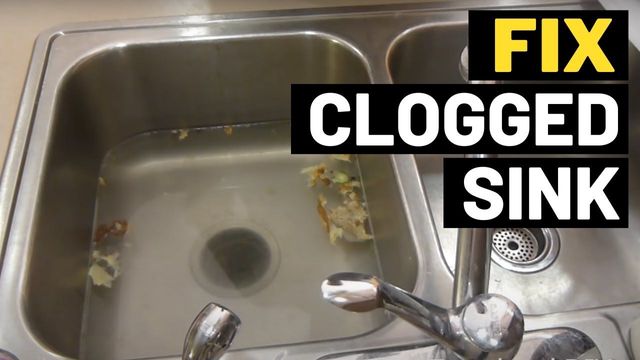The short answer is generally no. Using Drano in a kitchen sink with a garbage disposal is often not recommended and can potentially cause damage. This article explores why, the risks involved, and safer alternatives for dealing with clogs.

Image Source: lirp.cdn-website.com
The Dangers of Drano in Your Garbage Disposal
Drano is a powerful chemical drain cleaner designed to dissolve tough clogs. However, its harsh ingredients can react negatively with the components of your garbage disposal and plumbing system.
Drano Ingredients Effect Disposal
Drano typically contains chemicals like sodium hydroxide (lye) or sulfuric acid. These are highly corrosive substances. Here’s how they can affect your disposal:
- Damage to Blades: The caustic nature of Drano can corrode the metal blades of your garbage disposal, making them less effective over time.
- Plastic Component Degradation: Many garbage disposals have plastic parts. Drano can weaken or melt these components, leading to costly repairs or replacements.
- Pipe Damage: The chemicals can damage PVC pipes, especially in older plumbing systems.
- Hardened Clogs: In some cases, Drano can react with the clog material and harden it, making the blockage even worse. This is especially true with grease clogs.
Drano Damage Disposal: Real-World Consequences
Using Drano in your garbage disposal can lead to a range of problems. Here are some of the potential issues:
- Disposal Malfunction: Corrosion and damage to internal parts can cause the disposal to stop working altogether.
- Leaks: Weakened pipes or damaged seals can result in leaks under your sink.
- Costly Repairs: Repairing or replacing a damaged garbage disposal and plumbing can be expensive.
- Safety Hazards: Handling Drano can be dangerous. Splashes can cause burns, and the fumes can be harmful to inhale.
Alternative Approaches for Clog Removal Garbage Disposal
Rather than resorting to harsh chemicals like Drano, several safer and more effective methods can be used to clear clogs in your garbage disposal.
Natural and Safe Methods for Unclog Kitchen Sink Disposal
These methods rely on common household items and are less likely to damage your disposal or plumbing.
- Hot Water: Sometimes, simply running hot water for a few minutes can dissolve grease and food particles causing the clog.
- Baking Soda and Vinegar: This classic combination is a gentle yet effective cleaning solution.
- Pour one cup of baking soda down the drain.
- Follow with one cup of vinegar.
- Let it fizz for 30 minutes.
- Flush with hot water.
- Baking Soda and Salt: Similar to the vinegar method, this uses the abrasive properties of salt for added cleaning power.
- Pour 1/2 cup baking soda and 1/2 cup salt down the drain.
- Let it sit for a few hours or overnight.
- Flush with boiling water.
- Boiling Water: Pouring boiling water down the drain can melt grease and dislodge some blockages. Use caution, especially if you have PVC pipes. Pour slowly to avoid damage.
- Plunger: A standard cup plunger can often dislodge clogs in the drainpipe. Ensure there’s enough water in the sink to create a seal.
Manual Clog Removal
Sometimes, a clog is too stubborn for simple solutions. In these cases, manual removal might be necessary.
- Turn off the Power: Always disconnect the power supply to the garbage disposal before attempting any manual removal to prevent accidental activation.
- Use Tongs or Pliers: Carefully remove any visible debris from the disposal chamber using tongs or pliers. Be careful not to damage the blades.
- Check the P-Trap: The P-trap is the curved pipe under the sink. It often traps debris. Place a bucket underneath, loosen the slip nuts, and remove the P-trap to clean it out.
Best Drain Cleaner For Garbage Disposal: When to Consider Alternatives
While natural methods and manual removal are preferable, sometimes a stronger drain cleaner might seem necessary. If you must use a commercial drain cleaner, choose one specifically labeled as garbage disposal drain cleaner safe. However, even these should be used sparingly and with caution.
Considerations for Chemical Drain Cleaners
- Enzyme-Based Cleaners: These cleaners use enzymes to break down organic matter, making them a gentler option than chemical-based cleaners.
- Read Labels Carefully: Always read and follow the manufacturer’s instructions. Use the recommended amount and avoid overuse.
- Ventilation: Ensure good ventilation when using any drain cleaner.
- Protective Gear: Wear gloves and eye protection to avoid skin and eye irritation.
A Comparison of Drain Cleaning Options
| Method | Effectiveness | Safety | Cost | Environmental Impact |
|---|---|---|---|---|
| Hot Water | Low | Very High | Low | Low |
| Baking Soda and Vinegar | Medium | High | Low | Low |
| Baking Soda and Salt | Medium | High | Low | Low |
| Boiling Water | Medium | Medium | Low | Low |
| Plunger | Medium | High | Low | Low |
| Manual Removal | High | Medium | Low | Low |
| Enzyme-Based Cleaners | Medium | Medium | Medium | Medium |
| Chemical Drain Cleaners (Drano) | High | Low | Medium | High |
Preventing Future Garbage Disposal Drain Blockage
Prevention is always better than cure. Here are some tips to keep your garbage disposal running smoothly:
- Avoid Disposing of Problematic Items: Never put grease, oil, coffee grounds, bones, fibrous vegetables (celery, asparagus), pasta, rice, or eggshells down the disposal.
- Run Cold Water: Always run cold water while the disposal is operating. This helps solidify grease and allows it to be flushed away more easily.
- Cut Food into Small Pieces: Large chunks of food can overload the disposal and cause clogs.
- Regular Cleaning: Clean your garbage disposal regularly by grinding ice cubes and citrus peels to freshen and clean the blades.
- Use a Strainer: A sink strainer catches food scraps before they enter the drain, significantly reducing the risk of clogs.
Drano Alternative Garbage Disposal: What Works Best?
If you’re looking for a Drano alternative garbage disposal, consider these factors:
- Effectiveness: How well does the alternative clear clogs?
- Safety: Is it safe for your disposal and plumbing?
- Environmental Impact: Is it eco-friendly?
- Ease of Use: How easy is it to apply and use the alternative?
Based on these factors, the baking soda and vinegar method is often the best overall alternative. It’s effective, safe, environmentally friendly, and easy to use. Enzyme-based cleaners are another good option for regular maintenance.
Fathoming Kitchen Sink Drain Cleaner Options
Navigating the world of kitchen sink drain cleaners can be overwhelming. Here’s a breakdown:
The Spectrum of Cleaners
Kitchen sink drain cleaners range from environmentally-friendly solutions to potent chemicals. Natural methods like baking soda and vinegar offer a gentle yet effective cleaning process. On the other hand, chemical options, like Drano, use harsh substances that can swiftly dissolve obstructions but carry risks.
Matching Cleaners to Clog Types
Different clogs respond differently to various cleaners. Grease-based clogs may dissolve with hot water or a baking soda mixture, while tougher blockages might need manual removal or enzymatic solutions. Identifying the clog’s nature helps in selecting the appropriate cleaner.
Considering Environmental Consequences
Chemical drain cleaners, while effective, often contain harmful chemicals that pollute waterways. Choosing eco-friendly alternatives not only protects your plumbing but also contributes to environmental sustainability.
FAQ: Addressing Common Concerns About Drano and Garbage Disposals
- Can I use Drano once in a while if I flush it with lots of water? Even infrequent use can cause cumulative damage. It’s best to avoid it altogether.
- What if Drano has already been used in my disposal? Flush the disposal with plenty of cold water for several minutes. Check for leaks. If you notice any damage or malfunction, consult a plumber.
- Are enzyme-based cleaners safe for all types of garbage disposals? Generally, yes. However, it’s always a good idea to check the manufacturer’s instructions for your specific model.
- How often should I clean my garbage disposal? Ideally, you should clean your disposal weekly with ice and citrus peels and do a more thorough cleaning with baking soda and vinegar monthly.
- What do I do if the clog persists despite trying all the methods mentioned? If the clog is severe and unresponsive to home remedies, it’s best to call a professional plumber to avoid further damage to your plumbing system.
By avoiding harsh chemicals like Drano and adopting preventative measures, you can keep your garbage disposal and plumbing system running smoothly for years to come. Using natural methods and safer alternatives can effectively tackle clogs while protecting your investment and the environment.

Hi, I’m Larry Fish, the mind behind MyGrinderGuide.com.. With a passion for all things kitchen appliances, I created this blog to share my hands-on experience and expert knowledge. Whether it’s helping you choose the right tools for your culinary adventures or offering tips to make your kitchen more efficient, I’m here to guide you. My goal is to make your time in the kitchen not only easier but also enjoyable! Welcome to my world of kitchen mastery!
